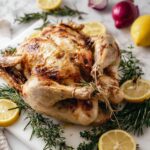Description
A spatchcocked turkey recipe that involves removing the backbone and flattening the bird for even roasting. This method reduces cooking time and results in crispy skin and juicy meat. The turkey is seasoned simply with salt, pepper, and optionally basted with olive oil or butter and stuffed with fresh herbs and aromatics.
Ingredients
Scale
Turkey
- 1 whole turkey (10-14 pounds)
- Salt and pepper, to taste
- Olive oil or melted butter (for basting)
Optional Aromatics
- Fresh herbs (rosemary, thyme, sage), optional
- 1 lemon, halved, optional
- 1 head of garlic, halved, optional
- 1 onion, quartered, optional
Instructions
- Preheat oven: Preheat your oven to 450°F (230°C) to prepare for high-heat roasting that will crisp the skin and cook the turkey evenly.
- Position turkey: Place the turkey breast-side down on a large cutting board or clean surface to prepare for spatchcocking.
- Remove backbone: Using kitchen shears or a sharp knife, cut along both sides of the turkey’s backbone carefully. Reserve the backbone for making stock if desired.
- Flatten the bird: Flip the turkey over so it’s breast-side up and press down firmly on the breastbone to flatten the bird, which allows it to cook faster and more evenly.
- Season the turkey: Generously season the entire skin surface with salt and pepper, rubbing it in for flavor.
- Add aromatics (optional): Stuff the cavity with fresh herbs, lemon halves, garlic, and onion quarters to infuse flavor during roasting.
- Baste the skin: Drizzle olive oil or melted butter over the skin and rub it in thoroughly to promote browning and crispiness.
- Roast the turkey: Place the prepared turkey in the preheated oven and roast for 1.5 to 2 hours, or until a meat thermometer inserted into the thickest part of the breast registers 165°F (74°C).
- Rest before carving: Remove the turkey from the oven and let it rest for 15-20 minutes to allow the juices to redistribute, ensuring juiciness when carving.
Notes
- Spatchcocking reduces cooking time by allowing the turkey to lay flat and cook evenly.
- Using a meat thermometer is crucial to avoid overcooking or undercooking the turkey.
- Reserve the backbone for making flavorful turkey stock or broth.
- Resting the turkey before carving helps retain moisture and enhances tenderness.
- Optional aromatics like herbs, lemon, garlic, and onion add depth of flavor but can be omitted if desired.

